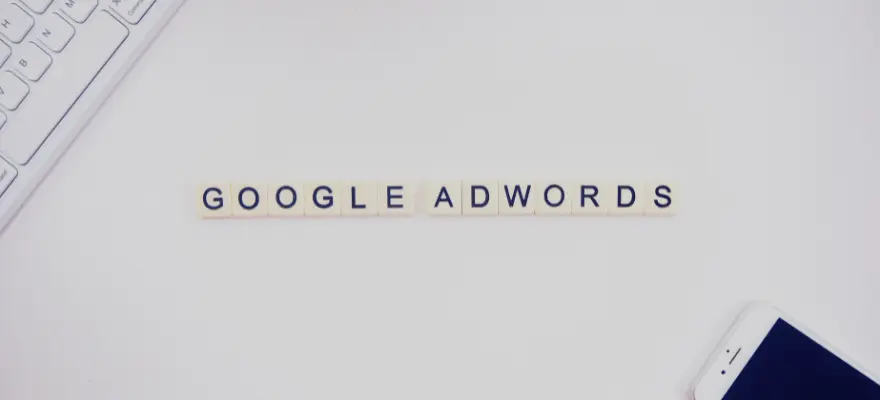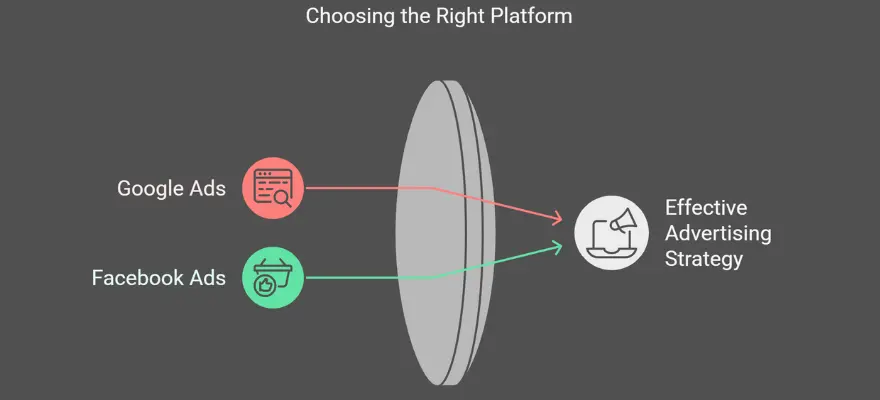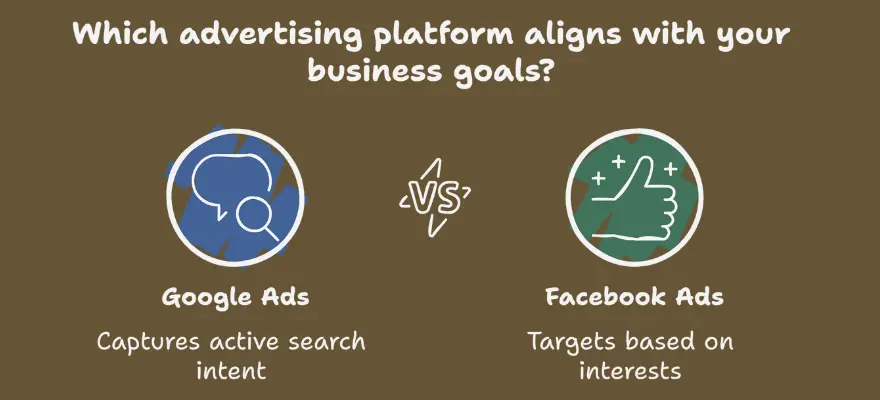Overview
The primary difference between Google Ads and Facebook Ads is user intent: Google Ads is “demand capture,” targeting users actively searching for a solution, while Facebook Ads is “demand generation,” reaching users based on interests and demographics. Google Ads typically offers higher conversion rates for immediate sales, whereas Facebook Ads is more cost-effective for brand awareness, visual storytelling, and nurturing long-term customer relationships.
Thinking about running ads but stuck choosing between Google Ads and Facebook Ads?
Many business owners struggle with deciding where to invest their advertising budget.
Should you focus on Google search ads that pop up when customers are actively looking for something? Or go with Facebook ads, where you target people based on their interests and behaviour?
Let’s break it down in simple terms, so you can make the right choice for your business use.
Key Takeaways
- Google Ads is great for direct search intent and high-converting products, making it ideal for businesses looking for immediate leads. While Facebook Ads is perfect for brand awareness and audience targeting, helping businesses reach new potential customers.
- Cost-per-click (CPC) tends to be lower on Facebook, but Google brings higher intent traffic, leading to better conversion rates.
- Using both platforms gives the best long-term marketing results by leveraging both intent-based and interest-based advertising strategies.
- Online advertising success depends on the right balance of search engine advertising, social media marketing, and strategic advertising campaigns that align with business goals.
Understanding Google Ads

What is Google Ads?
Google Ads (formerly Google Adwords) is pay-per-click (PPC) advertising that helps businesses show up in Google search results, YouTube, and the Google Display Network. It is a core tool in search engine marketing and plays a crucial role in digital marketing.
How Google Ads Work
When someone searches for a product or service on Google, paid ads appear at the top of the search engine results page.
Google also has display ads, shopping ads, and video ads, giving businesses multiple ways to connect with potential customers through targeted advertising.
Advantages of Using Google Ads?
- High intent – People are already searching for what you offer
- Multiple ad formats – Search ads, shopping ads, display ads
- Scalable – Increase or decrease your budget anytime
- Measurable results – Track conversions through Google Analytics
- Supports conversion marketing – Helps increase advertising revenue
Best Practices for Google Ads
- Use Google Ads for high-converting keywords
- Try Google Shopping ads for e-commerce products
- Optimize landing pages for better conversion rates
- Use Google Analytics to track and improve performance
- Leverage the Google Display Network for digital display advertising
- Implement search engine optimization (SEO) strategies to complement paid ads
Understanding Facebook Ads

What is Facebook Ads?
Facebook Ads (part of Meta Platforms) let businesses reach specific audiences based on their interests, behaviours, and demographics.
How Facebook Ads Work
Instead of showing ads to people searching for something (like Google), Facebook targets users based on their activity, location, and interests.
Why Use Facebook Ads?
- Great for brand awareness – Reach people before they even think about buying
- Cost-effective – Typically lower cost-per-click than Google Ads
- Highly targeted – Use audience data for behavioral retargeting
- Multiple placements – Ads appear on Facebook and Instagram, Messenger, and Audience Network
- Supports email marketing and word-of-mouth marketing
Best Practices for Facebook Ads
- Use video ads for higher engagement
- Retarget website visitors with Facebook Pixel
- A/B test ad creatives to find what works best
- Optimize for conversion marketing with custom audiences
- Use Facebook Ads Manager to monitor campaign performance
- Utilize email marketing for follow-ups and lead nurturing
Key Differences Between Google Ads and Facebook Ads
Google Advertising
- Intent-based ads (people actively searching)
- Best for high-converting search terms
- Works well for local services, e-commerce, and high-ticket products
- Can be expensive for competitive industries
- Includes Google Shopping ads and Google Display ads
- Works well for search advertising and paid search ads
- Helps businesses track customer behavior through Google Analytics
Facebook Advertising
- Interest-based ads (target users based on behavior)
- Best for brand awareness and retargeting
- Works well for low-cost items, impulse buys, and lead generation
- Typically cheaper cost-per-click than Google Ads
- Facebook ads typically perform well on social media platforms like Facebook
- Helps build demography-based advertising campaigns
- Supports advertising campaign tracking via Facebook Ads Manager
Choosing the Best Advertising Platform for Your Business

Not sure which to pick? Here’s how to decide:
Use Google Ads if:
- You sell high-demand products/services (plumbing, legal, e-commerce)
- You need instant conversions from search advertising
- You want to appear on Google Search and YouTube
- You need Google Ads campaigns that include shopping ads
- You rely on search engine marketing for lead generation
Use Facebook Ads if:
- You want to build brand awareness over time
- You sell visually appealing products (fashion, beauty, lifestyle)
- You need affordable lead generation
- You prefer social media ads on Facebook and Instagram
- You want to leverage behavioral data for targeted advertising
Pro Tip: The best strategy? Use both Google Ads and Facebook Ads for a complete advertising campaign.
FAQ
Can I use both Google Ads and Facebook Ads?
Yes! Many businesses combine them for maximum reach.
Which is cheaper, Google Ads or Facebook Ads?
Facebook Ads generally have a lower CPC, but Google Ads may drive higher intent traffic.
Which platform works better for local businesses?
Google Ads, especially Google Search Ads, work best for local businesses like plumbers and lawyers.
How do I know which platform is right for my business?
If your business relies on immediate searches (like emergency plumbing), Google Ads is better. If you’re building brand awareness or selling impulse products, Facebook Ads campaigns work best.
Can I run ads with a small budget?
Yes! Both platforms allow flexible budgeting. Start small, test different ads, and scale up as you see results. Free Google Ads credits are sometimes available for new advertisers.
Conclusion
There’s no one size fits all when it comes to advertising. If there were, we’d all be millionaires by now.
If you need fast conversions from search engine results, go with Google Ads because nothing says “buy now” like showing up exactly when someone searches for your product.
If you want cost-effective audience targeting and brand building, try Facebook Ads where you can nudge people into buying things they didn’t even know they needed.
And if you want the best results?
Use both Google Ads and Facebook Ads together, because when it comes to Google and Facebook advertising, two platforms are better than one.
Ready to Take Your Advertising to the Next Level?
Choosing between Google Ads and Facebook Ads can be challenging, but you don’t have to figure it out alone. If you’re ready to maximize your ad strategy and get real results, let’s chat.
Book a Free Call and get expert advice tailored to your business.




